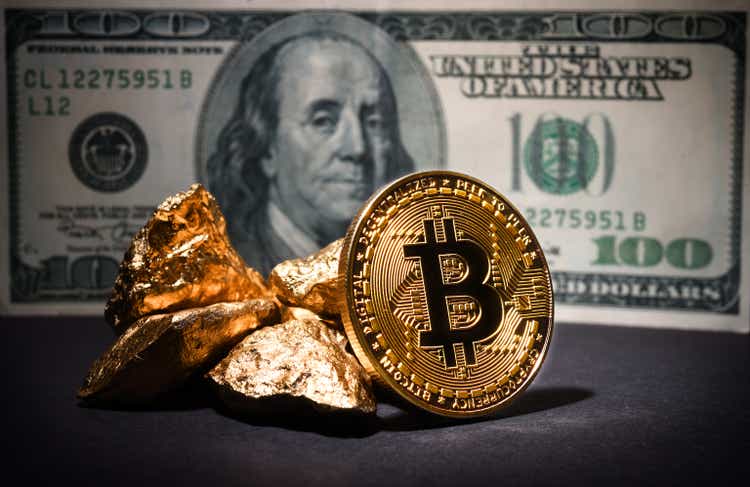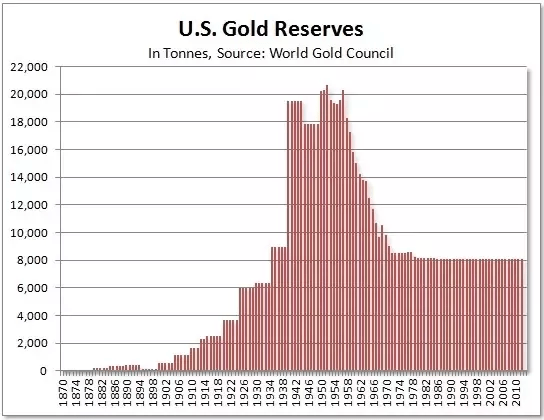hocus-focus/iStock Unreleased via Getty Images
Thesis Summary
Bitcoin (BTC-USD) is often referred to as digital gold. Indeed, the world’s premier cryptocurrency was designed for this purpose. Bitcoin and gold (GLD) share many similarities, but there are also some key differences which, in my opinion, make Bitcoin a superior form of money to gold.
Standing on the Shoulders of a Giant
Bitcoin was made to mimic gold because it is designed as a store of value, and over the course of human history, gold has risen as the best store of value and money available.
Humans always have coveted gold around the globe, even though it has no significant “industrial” use, which makes it such a great form of money. It is readily available because humans have been storing it since the dawn of time, but it is also hard to obtain. Also, it is malleable and easily divisible.
All of these factors make gold not only a good store of value but good to use in trade. Gold is relatively abundant, making it easy for a society to define its prices in gold, but it is also hard to obtain/mine, meaning it has value and, more importantly, a stable value.
In an imperfect world, gold is as close as we had to perfect money.
For this reason, Bitcoin was made to mimic gold, at least in two key ways. First off, the supply is capped at 21 million Bitcoin. Meanwhile, estimates suggest that around 201,296 tonnes of gold have been mined, with around 53,000 tonnes left in identified reserves. Of course, there is the possibility that new reserves will be found, but this is unlikely to be significant to the overall supply. After all, we have been looking for gold for years.
However, the perhaps more important similarity that Bitcoin has with gold is its cost of extraction, something which now sets it apart from the second largest cryptocurrency, Ethereum (ETH-USD).
Mining Bitcoin requires expensive hardware and consumes vast amounts of energy, and every four years, Bitcoin is programmed to halve the reward for mining a Bitcoin block. This is similar to gold, which gets harder to mine as you have to dig deeper into the earth’s surface. All the easily mined gold or surface-level gold has already been obtained, and so has all the easily obtainable Bitcoin. (Back in 2012, one could mine a significant amount of Bitcoin with a standard laptop).
What’s most important to understand, though, is that the costly mining method grounds Bitcoin’s value in the real world, just like it did for gold. Proof-of-Work is proof-of-value.
Therefore, Bitcoin shares many of gold’s virtues; it is practical and available but with a limited supply. It is stable in value because it has no practical use, and its supply can’t suddenly increase.
But Bitcoin is even better than gold in at least three key areas.
Practicality
While gold is a malleable metal, saying it is easily divisible and countable may be an exaggeration. In reality, gold wasn’t a practical tool for trade until it began to be minted into standardized coins. However, this throws a big wrench in the gold bull case. Minting and “standardization” were only made possible once big power structures were in place. Big governments like the ones in the Roman Empire and long-standing Chinese dynasties were amongst the first to create coins that were so easily recognizable and trusted that they could exchange hands anywhere on the planet.
One of the advantages of gold is its ability to act as a neutral and censorship-free form of money, but in order to actually be practical, it was necessary to establish a centralized entity that could mint coins. Of course, we all know how often the Romans ended up devaluing their currency.
Beyond coins, gold certificates have also been used as a practical way of trading gold, but these are not without problems. While it is much easier for independent banks to do this, eliminating the need for a centralized entity, we are now faced with another dilemma; gold certificates are not equivalent to gold.
Even if the bank issuing the certificate has a 100% coverage ratio, the certificate is ultimately a promise to pay gold, not gold. This introduces counterparty risk into the equation. All fiat currencies today are a counterparty to government debt, which exposes the whole economy to counterparty risk. What happens if the US government defaults? Complete economic collapse.
The appeal of physical gold is that it has no counterparty risk, but it is not practical to trade. On the other hand, Bitcoin can be traded in its purest form, unadulterated Bitcoin sent between market participants, with no need for an intermediary. This is even more relevant in today’s digital world.
Neutrality
Neutrality is another key reason why gold has always been heralded as a superior form of money. It is not controlled by anyone. It knows not of borders or political affiliations. Anyone can buy it, and everyone will accept it. There are some caveats, of course.
Although gold can be freely bought in most countries, it is also true that most of the gold production in the world comes from a few countries. Bitcoin is more democratic in the sense that literally anyone can mine it. Even if you don’t have dedicated hardware, you could join a mining pool.
The other big issue is that gold, due to its physician nature, needs to be secured, which also gives the custodian a lot of power. We can see in the chart below how the US accumulated gold reserves during World War I and World War II.
US Gold Reserves (World Gold Council)
Many Allied countries sent their gold reserves to the US, not because they particularly wanted to, but because they were afraid the Nazi troops would seize the gold upon invasion, which is exactly what they did.
This put the US in a very powerful position, which, of course, led to abuse. Bretton Woods created a dollar-centered system, where currencies were redeemable in dollars, and dollars only were redeemable in gold. However, it only took a couple of decades before the US reneged on its promise when Nixon “closed the gold window” in 1971.
This happened because gold has certain limitations. This wouldn’t have happened with Bitcoin. Digital currency is much easier to store and secure. This protects it from theft, fraud, and undue accumulation.
Censorship
Lastly, I would argue that once again, thanks to its digital properties, Bitcoin is more censorship resistant than gold.
All around the world, gold has been the victim of censorship precisely because it is such a powerful form of money. Politically motivated fiat systems cannot compete head-to-head with gold, which is why there have been numerous gold bans worldwide.
In 1934, the gold reserve act banned private ownership of gold ahead of a massive dollar devaluation. In China, as of right now, retail traders are being limited when it comes to precious metal ownership. And meanwhile, Central Banks are stockpiling gold like they haven’t in over 50 years.
This hardly seems fair; it is another limitation that gold has, and Bitcoin doesn’t. Bitcoin can move freely and anonymously. A law could be enacted to ban Bitcoin ownership, but how would it even be enforced? Short of torturing citizens for their private keys, there is little the government could do to seize Bitcoin. And what’s more, economic trade could still occur despite a Bitcoin ban. Peer-to-peer transactions in Bitcoin can’t be stopped by decree.
Once again, Bitcoin excels where gold fails.
Final Thoughts
In conclusion, there are clear advantages to Bitcoin as a store of value over gold. This is not to say gold ownership doesn’t have its place. Furthermore, it’s important to concede one point to the yellow metal. Gold has a very long history of acting as a store of value, which makes it even more reliable as a store of value. Bitcoin is barely 13 years old, so it still has some history to make.


Be the first to comment